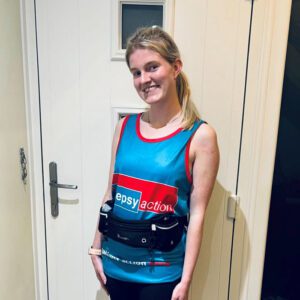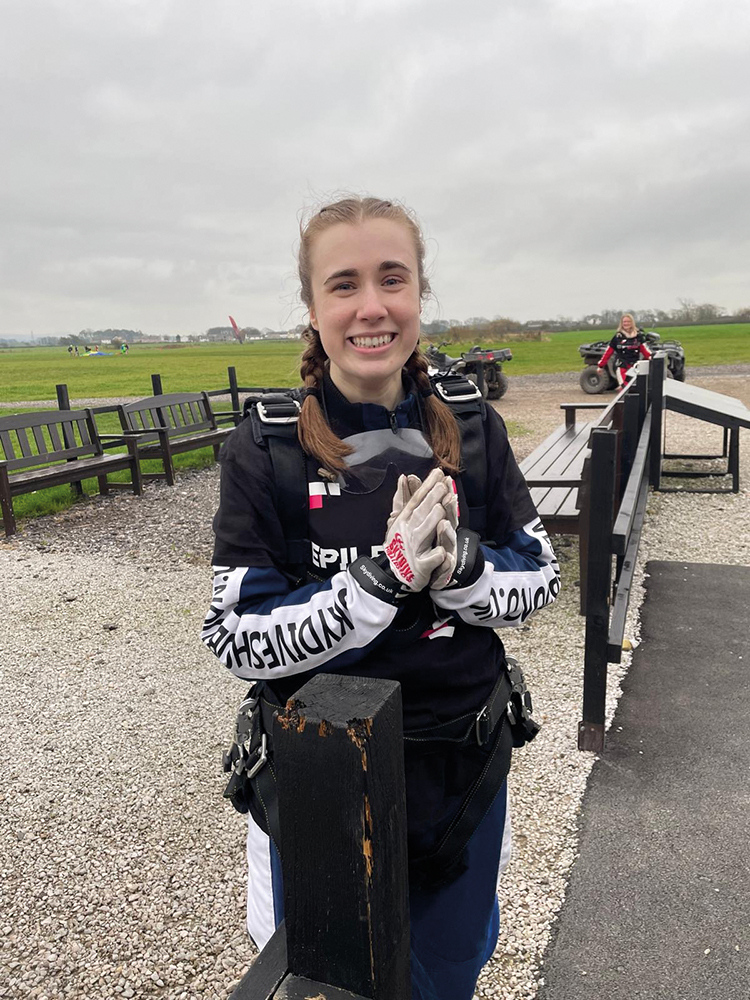Catrin
 Catrin Jones, 26, from Caernarfon in Wales, is running for her daughters Esmi, 5, and Nanw, 3, who have both been diagnosed with epilepsy.
Catrin Jones, 26, from Caernarfon in Wales, is running for her daughters Esmi, 5, and Nanw, 3, who have both been diagnosed with epilepsy.
Catrin said she wanted to give back to Epilepsy Action because it had supported her family and others who are affected by epilepsy.
She said: “By running the London Marathon, I’m giving back to a charity that has helped us so much since Esmi and Nanw’s diagnosis.”
Catrin first noticed her eldest daughter Esmi experiencing “episodes”, which the family later found out were focal seizures.
“It initially started with Esmi when she was two years old,” she said. “She had periods of long and frequent episodes of ‘daydreaming’ and being unaware of her surroundings.
“During investigations for epilepsy, the frequency of these episodes increased, and her eyes started to roll while she was having them. She also started to have jerking movements and stiffening, which led to her diagnosis of focal epilepsy.”
When Catrin’s youngest daughter, Nanw, turned two, she also started to experience seizures.
“Fast forward one and a half years and Nanw started to have episodes of absences where her eyes would roll. She’d also fall to the ground when they happened,” said Catrin.
During the difficult early stages of Esmi and Nanw’s diagnoses, Catrin turned to Epilepsy Action for support.
“As a parent, watching my children have seizures has left me feeling a bit helpless at times,” she said. “During the initial stages of tests to confirm epilepsy, Epilepsy Action helped us spectacularly. I was constantly using its helpline for advice.
“Not only has the charity helped me to understand the condition better, but it has always been there to offer a sympathetic ear.”
Although Esmi and Nanw now have fewer seizures than they used to, thanks to their medication, the family still has to navigate many of the challenges of living with epilepsy.
Catrin said: “Since Esmi and Nanw started medication, their conditions have improved. And although it hasn’t completely stopped their seizures, they happen significantly less.
“We’re so proud of our daughters. They bring so much joy to our lives and are both adventurous, beautiful and happy.”
Megan
 Also on team Epilepsy Action is Megan Hunter from Loughborough, who said running had become a ‘lifeline’ for managing her epilepsy.
Also on team Epilepsy Action is Megan Hunter from Loughborough, who said running had become a ‘lifeline’ for managing her epilepsy.
She added: “The one thing keeping me going is running. I started in lockdown, and it is a huge motivator for me. I consider it a lifeline in my current circumstances and running the marathon will not only help me to raise money for a charity so personal to me, but it also helps me to navigate these new changes and help regain control of my life.”
Megan chose to raise money for Epilepsy Action because the charity offered her support when she needed it most.
“Epilepsy Action helped me realise I wasn’t alone by offering support groups and information pages.
“For those who are newly diagnosed, and parents or carers of people with epilepsy, Epilepsy Action is so supportive, understanding and knowledgeable,” she said.
Megan was diagnosed with epilepsy eight years ago while at university. She described the year after being diagnosed as “one of the most challenging years of [her] life”.
She said: “In 2016, while I was studying for a degree in history at the University of Lincoln, I had my first seizure when out with friends. Shortly after, I was diagnosed with Idiopathic Generalised Epilepsy.
“I feel the impact of my epilepsy every day, experiencing fatigue, confusion and memory loss. I had to postpone my studies and 2017 became one of the most challenging years of my life. Managing to still graduate was a battle, but I’m so pleased to have done so (albeit a year later).”
One of the challenges Megan faced was navigating the stigma and public fear that still surrounds epilepsy.
She said: “Discovering I had epilepsy lost me friends and made me really isolated due to the stigma of people feeling responsible for me and the fear of me having a seizure around them.
“Since 2017, I’ve been on the anti-seizure medicine lamotrigine and I had been seizure free since, until this past year when I started to have myoclonic jerks. In September 2023, I had another tonic-clonic seizure. It had a huge impact on my mental health and put my job in heritage at risk.”
 Megan is running the London Marathon this year as she wants to put epilepsy in the spotlight and encourage greater understanding of the condition.
Megan is running the London Marathon this year as she wants to put epilepsy in the spotlight and encourage greater understanding of the condition.
She said: “There is so much more to epilepsy than the physical seizures. I wish people knew more about the affect it has on your mental health, and that it can make you feel restricted and isolated.”
Megan and Catrin are just two of the more than 50 members of team Epilepsy Action at this year’s London Marathon.
Epilepsy Action staff and volunteers will be supporting our runners at around mile 12 at the cheer point on Tower Bridge.
Good luck to everyone taking part!
If you felt inspired by Megan and Catrin’s story, but the marathon feels like a few steps too far, join us for the Epilepsy Action virtual 10k.
You can run or walk the 6.2 miles at your own pace, from anywhere in the world, on a day of your choosing during National Epilepsy Week. Find out more here.
More articles



